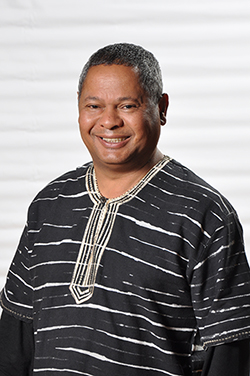Latest News Archive
Please select Category, Year, and then Month to display items
12 January 2024
|
Story Nonsindiswe Qwabe
|
Photo Sonia Small
 Since joining the UFS in 2008, Dr Grey Magaiza has worked extensively on approaches that can foster the socio-economic transformation of societies.
Since joining the UFS in 2008, Dr Grey Magaiza has worked extensively on approaches that can foster the socio-economic transformation of societies.
“The future should be one where communities can decide on their development agenda and futures. That’s the most important for me.” Dr Grey Magaiza, Deputy Director of the Centre for Gender and Africa Studies (CGAS) and Head of the Community Development programme on the Qwaqwa Campus, is passionate about capacitating communities to be agents of change and advancement. His vision for the future emphasises the empowerment of communities to take charge of their development by actively participating in decision making and the implementation of development projects that can improve their lives.
Since joining the UFS in 2008, Dr Magaiza has worked extensively on approaches that can foster the socio-economic transformation of societies. Over the years, he has crafted his research speciality into one that he is most proud of – being an interdisciplinary scientist immersed in the development of communities.
“I’m in a fortunate position of researching what I like. I say ‘fortunate’, because I’ve taken the time to understand what I’m passionate about, which is the overall field of rural livelihoods and livelihood futures – in short, community development. My research starts from an engaged university, understanding the elements that a university must use to enhance transformation and relevance to its immediate community in terms of development.”
One of the ways he has done this is by looking at social entrepreneurship as a development approach for young people in a rural setting. Through workshops with non-profit and civic organisations in Qwaqwa, Dr Magaiza has been helping these organisations to map out their needs and actively meet them through the involvement and support of external role players.
“We understand that communities are part of the national development agenda, but even that national agenda respects community knowledge and intentions and allows communities to shape their identity. A critical enabler of this is community organising. You bring back the capacity in communities to have dialogues on issues affecting them as spaces for engagement, knowledge exchange, and for people to just talk about their way forward.”
By enabling communities to define their development agenda, they can address their specific needs, challenges, and aspirations, he said. “When I look at livelihood futures, it’s quite an exciting aspect of my work – it’s like looking into a fortune tellers’ globe, because you’re not deciding for communities what they should do, but the communities themselves take those decisions.”
Prof Andre Keet to chair Ministerial Oversight Committee on Transformation
2017-07-14

Prof Andre Keet
Photo: Stephen Collet
Higher Education Minister Dr Blade Nzimande has increased from seven to 10 the number of members of the Ministerial Oversight Committee on the Transformation in the South African Public Universities.
In a government gazette published on 7 July 2017‚ Dr Nzimande appointed new members of the committee for a three-year term to be chaired by Prof Andre Keet, Director of the Institute for Reconciliation and Social Justice at the University of the Free State (UFS). Prof Keet is a returning member of the committee alongside former University of Fort Hare chancellor Dr Mvuyo Tom.
The purpose of the Ministerial Oversight Committee on Transformation in South African Public Universities is to monitor progress on transformation in public universities‚ serve as an expert advisory body and provide independent and external advice to the minister and the department.
The committee has been given 11 tasks‚ chief of which is to study and evaluate transformation plans and charters of all universities. It is mandated to use this exercise as a basis for the development of a sectoral transformation charter. It is also tasked with reviewing the annual reports of institutions on transformation and producing an annual report on the state of transformation in the higher education sector.
Prof Keet’s appointment comes at a pivotal time when transformation at universities has been at the heart of many debates in universities, government and broader society. Prof Keet said: “It is an honour and privilege to serve the sector at this level and in this capacity.”
The university is proud to have in its ranks a leader of such calibre who has also spearheaded transformation initiatives at the UFS through the Institute for Reconciliation and Social Justice over the past six years.